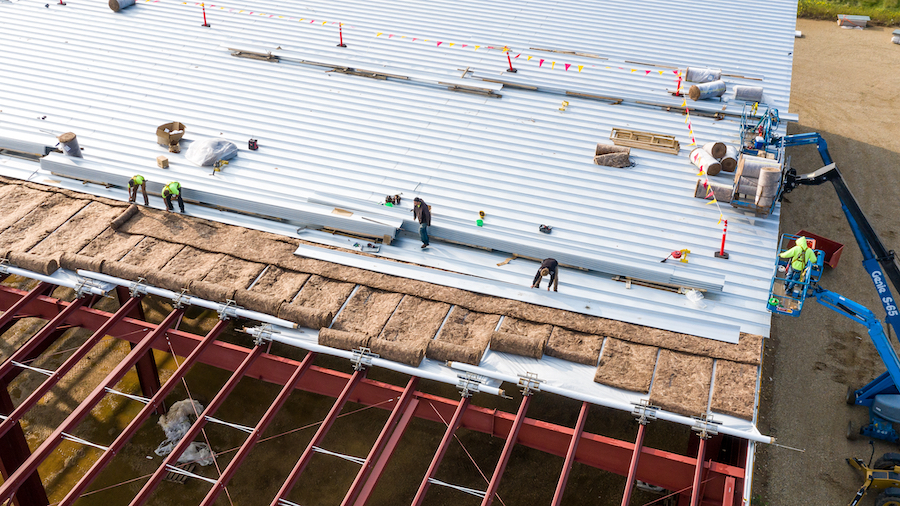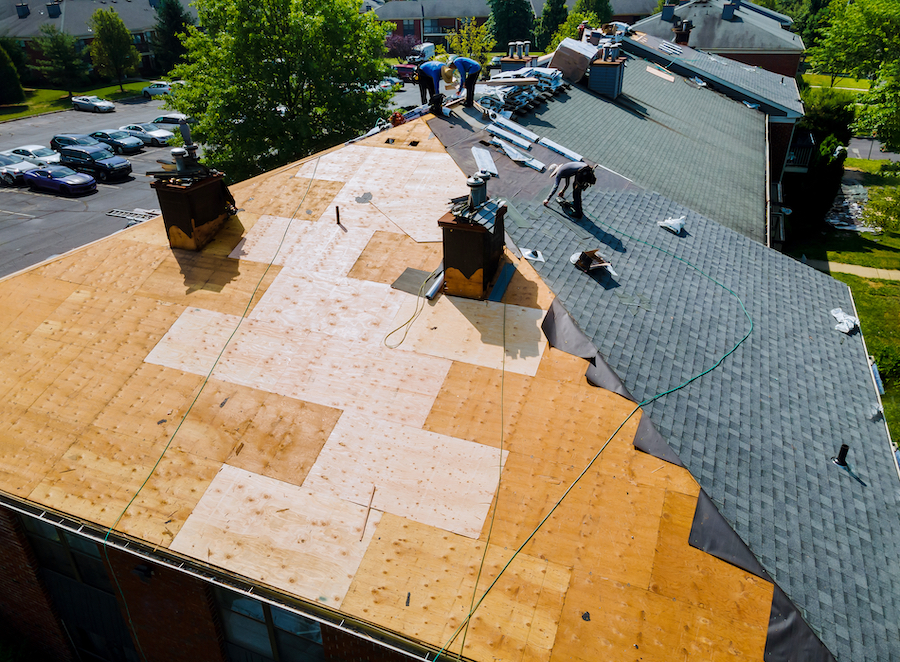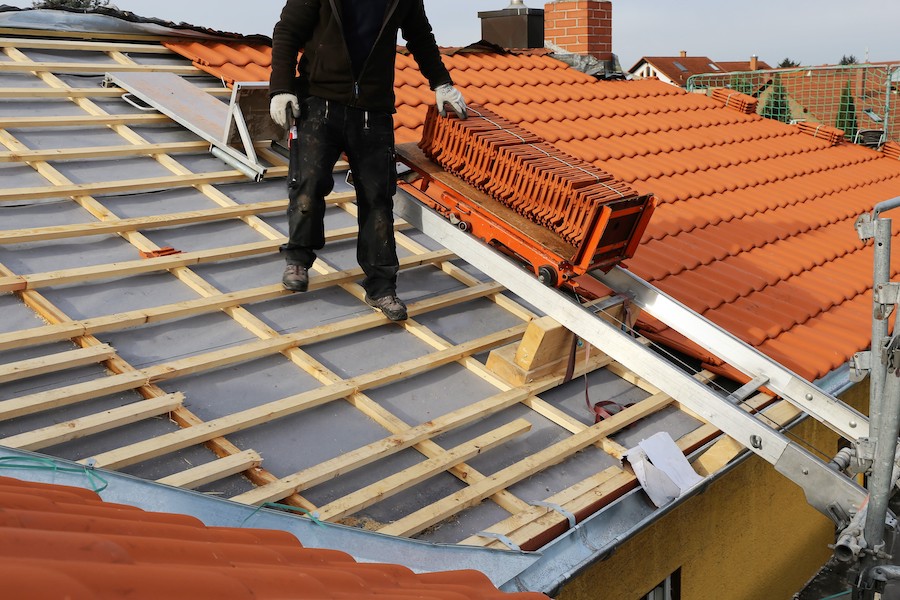Case Study: Perkins Roofing
- February 22, 2024
- AlexSmootCEO
- 0

Table of Contents
Our partner company, Sweat Venture, interviewed Tim Kanak, manager of Perking Roofing. Tim has extensive experience with operations management, business strategy, quality control, and everything else related to managing a successful roofing business.
A roofing business specializes in the installation, repair, and maintenance of roofs on residential, commercial, and industrial buildings. These businesses provide expertise in various roofing materials and structures—ensuring that roofs are weatherproof, durable, and compliant with local building codes. They often offer additional services such as inspections and consultations to assess the condition of roofs and recommend appropriate solutions.
Are you thinking about starting a roofing business? Or franchising? If so, consider these takeaways from Tim’s interview…
What Services Can You Offer?
Roofing businesses may provide a variety of services to ensure that roofs are not only functional but also enhance the overall aesthetics and efficiency of a building. Here is a list of the most common services offered:
- Roof installation: New roof construction on residential or commercial buildings.
- Roof replacement: Full removal and replacement of an existing roof.
- Roof repair: Fixing issues such as leaks, broken shingles, and structural damage.
- Leak detection and repair: Identifying the sources of leaks and making the necessary repairs.
- Roof maintenance: Regular inspections and upkeep to extend the life of a roof.
- Gutter installation and repair: Installing and maintaining gutter systems for proper roof drainage.
- Roof insulation and ventilation: Enhancing energy efficiency with appropriate insulation and ventilation.
- Emergency roofing services: Providing rapid response for roof damage from storms or other emergencies.
- Roof cleaning: Removing debris, moss, and stains to maintain roof quality and appearance.
- Skylight installation: Fitting skylights to increase natural light inside the building.
- Chimney repair and maintenance: Ensuring the roofing around chimneys is secure and leak-free.
- Solar panel installation: Installing solar panels to promote sustainable energy.
- Roof inspections: Conducting thorough inspections for maintenance or real estate transactions.
- Roof coatings: Applying coatings for additional protection and longevity.
- Flashing repair and installation: Waterproofing the joints and valleys of a roof.
- Roof restoration: Restoring the original condition of historical or aged roofs.
Each service is designed to ensure the roof not only looks great but also functions effectively for years to come, providing clients with confidence in their roofing investment.
How to Acquire Skills and Training?
An aspiring roofing business owner can acquire the necessary skills and training through a combination of formal education, hands-on experience, and industry-specific training. Here’s a structured path to consider:
- Education: Start with a high school diploma or equivalent, which is typically the minimum educational requirement. Further education—such as courses in business management, construction management, or a related field—can be beneficial.
- Technical training: Enroll in technical courses or a vocational school that offers roofing-specific programs. These courses often cover various roofing materials, installation techniques, safety protocols, and building codes.
- Apprenticeship: Seek out apprenticeship programs under experienced roofers or roofing companies. This provides on-the-job training and practical experience with the tools and materials of the trade.
- Certifications: Obtain professional certifications from recognized bodies in the roofing industry. Certifications can demonstrate expertise and may be required for certain advanced or specialized roofing work.
- Work experience: Gain experience by working in the roofing industry. Starting in entry-level positions and working up to more skilled roles can provide valuable insights into the business.
- Safety training: Complete safety training courses to understand the occupational hazards and safety requirements of roofing work.
- Business skills: Develop business management skills—which can include taking courses in small business management, finance, marketing, and human resources.
- Networking: Join roofing or construction industry associations to network with professionals, stay informed about industry trends, and access continuing education opportunities.
- Licensing: In many regions, roofing contractors are required to have a license. Investigate the requirements in your area and take any necessary exams or complete any required paperwork to become licensed.
- Continuing education: Stay current with continuing education opportunities to keep up with new materials, techniques, and regulations in the roofing industry.
By combining these educational and practical experiences, an aspiring roofing business owner can build a strong foundation of skills and knowledge to successfully start and run a roofing business.

The Most Essential Project Management Skills
For a roofing business owner, essential project management skills are critical to ensuring that roofing projects are completed on time, within budget, and to the satisfaction of clients. Here are the key project management skills that should be considered:
- Planning and forecasting: Ability to create detailed plans that outline project timelines, required materials, labor needs, and contingencies.
- Budget management: Skill in preparing and adhering to budgets, minimizing expenses, and maximizing resource efficiency.
- Time management: Allocating time wisely, setting realistic deadlines, and ensuring timely completion of projects.
- Quality control: Ensuring that all aspects of roofing work meet or exceed industry standards and customer expectations.
- Team leadership and delegation: Leading a team effectively, delegating tasks appropriately, and maintaining high morale and productivity.
- Communication: Clearly conveying project goals, updates, and expectations to clients, suppliers, and team members.
- Risk management: Identifying potential risks and creating mitigation strategies to prevent project disruptions.
- Problem-solving: Quickly resolving issues that arise during the project with effective solutions.
- Contract management: Understanding and managing contracts with clients, subcontractors, and suppliers.
- Customer service: Providing excellent service to ensure customer satisfaction and build a strong reputation.
Developing these skills can lead to successful project outcomes, repeat business, and referrals, which are vital for the growth and sustainability of a roofing business.

What Risks to Expect?
A roofing business owner should be prepared to manage several risks associated with the industry:
- Safety hazards: Working at heights, handling heavy materials, and exposure to the elements can lead to accidents and injuries.
- Liability claims: Injuries on the job site or property damage can result in liability claims against the business.
- Weather dependence: Inclement weather can delay projects, damage works-in-progress, and impact overall business productivity.
- Regulatory compliance: Failing to adhere to building codes, regulations, and permit requirements can result in fines and legal issues.
- Fluctuating material costs: Prices for roofing materials can vary, impacting the profitability of fixed-cost contracts.
- Skilled labor shortages: Difficulty in finding and retaining qualified roofing professionals can affect business operations and quality of work.
- Competitive market: A high level of competition in the roofing industry can pressure profit margins and market share.
- Warranty and workmanship issues: Post-installation issues may require additional work at no extra charge under warranty claims.
By understanding and planning for these risks, a roofing business owner can take proactive steps to mitigate them—such as by obtaining adequate insurance, implementing strict safety protocols, and managing financial reserves for lean times.

How to Get Clients
To attract new clients, a roofing business owner should implement a marketing strategy that encompasses both digital and traditional methods. A professional website serves as the digital cornerstone of the business, while search engine optimization (SEO) increases online visibility to attract leads. Active engagement on social media platforms helps to connect with the community and showcase the business’s services and successful projects. In addition, local SEO tactics are crucial for appearing in searches for roofing services in the area.
Online advertising, such as Google Ads and targeted social media campaigns, can reach potential customers by focusing on specific demographics and geographic locations. These efforts should complement offline strategies to cover all potential client touchpoints.
Networking with local contractors, real estate agents, and participation in community events can lead to valuable referrals and partnerships. Traditional marketing methods—including flyers, local newspaper ads, and billboards—can also be effective, particularly in certain local markets.
On a final note, the power of word-of-mouth should not be underestimated. Providing excellent customer service encourages satisfied clients to refer others.

How to Price Jobs
Pricing jobs accurately is critical for the success of a roofing business, and it requires a careful balance between competitive pricing and profitability. A roofing business owner should conduct thorough market research to understand the going rates for roofing services in the area, which includes evaluating competitors’ prices and understanding the local economic conditions that may affect what clients are willing to pay.
The next step involves detailed cost estimation. The business owner must account for all the direct costs associated with a job—such as materials, labor, equipment rental, and permits. It’s also important to include indirect costs like office expenses, insurance, and vehicle maintenance. An accurate estimate ensures the business covers its costs and achieves a desired profit margin.
Also, the pricing strategy should reflect the value provided to the customer. A business owner might consider value-based pricing for high-quality, specialized, or expedited services. Transparent pricing models can build trust with clients, so providing clear and detailed quotes can help justify the prices. The business owner should also factor in any warranties or follow-up services included in the job.

Insurance, Permits, and Licenses
For a roofing business owner—having the right insurance, permits, and licenses is crucial to operate legally and protect the business against potential liabilities. Here’s a breakdown of what’s typically required:
- General liability insurance: Protects against third-party claims of bodily injury, property damage, and personal injury. It’s essential for covering accidents that can occur on a job site.
- Workers’ compensation insurance: Required in almost all states if the business has employees. It covers medical costs and lost wages for work-related injuries or illnesses.
- Commercial auto insurance: For businesses that use vehicles for transport of tools, materials, or employees—this insurance covers damages from accidents.
- Professional liability insurance (errors and omissions): Protects the business in case of claims related to mistakes or negligence in the professional services provided.
- Tools and equipment insurance: Covers the repair or replacement of stolen, lost, or damaged tools and equipment.
- Building permits: Often required for each job where significant construction or alteration work is being performed. The specific requirements can vary by location, depending on local building codes and regulations.
- Business license: Most localities require a general business license to operate.
- Contractor’s license: Many states require a specific contractor’s license for roofing work. Obtaining this license typically involves passing an exam that tests knowledge of the trade and local building codes.
- Specialty licenses: Depending on the state or locality, additional specialty licenses may be required for certain types of roofing work or to handle specific materials.
Also, it’s important for roofing business owners to stay informed about the specific requirements in their area, as regulations can vary significantly by state and local jurisdiction. Staying compliant not only protects the business from fines and penalties but also builds trust with clients by demonstrating professionalism and adherence to standards.

How Much Will it Cost?
The cost to start a roofing business can vary widely based on several factors—including the scale of operations, location, and the services offered. Here’s a breakdown of potential startup costs:
- Business registration and licensing: Costs can range from a few hundred to over a thousand dollars, depending on state and local requirements.
- Insurance: Initial premiums for general liability, workers’ compensation, and vehicle insurance can total several thousand dollars.
- Tools and equipment: Basic tools might cost between $1,000 to $10,000, while more specialized equipment could significantly increase this expense.
- Vehicle: A reliable work truck or van is essential. Used vehicles might range from $10,000 to $30,000, while new ones can exceed this range.
- Office space/storage: If not operating from home, leasing office or storage space can add significantly to initial costs—varying widely by location.
- Marketing and advertising: Initial marketing efforts—including website development, business cards, and signage—can range from $2,000 to $5,000.
- Technology and software: Basic software for scheduling, invoicing, and project management might cost between $100 to $500 per month.
- Payroll: If hiring employees, payroll will be a significant ongoing expense.
- Insurance premiums: Ongoing costs for insurance must be considered for budgeting.
- Materials: The cost of roofing materials will vary by project but is a significant part of the operational expenses.
- Maintenance and fuel for vehicles: Regular maintenance and fuel for any business vehicles are ongoing costs.
- Marketing: Continual investment in marketing is necessary to attract new clients.
Given these ranges, a rough estimate for starting a small to medium-sized roofing business could be between $20,000 to $50,000—considering some used equipment and vehicles. However—this estimate can significantly increase based on the choice to purchase new vehicles, more expensive equipment, or if starting with a larger team of employees.
It’s also important for prospective business owners to have additional capital for operating expenses in the first few months, as it can take time to generate consistent income. Planning for these expenses in advance and having a clear budget can help in successfully launching and sustaining a new roofing business.

